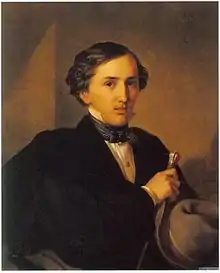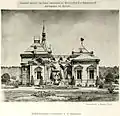Alexander Kaminsky
Alexander Stepanovich Kaminsky (1829–1897, Russian: Александр Степанович Каминский, sometimes spelled Kamensky, Каменский) was a Russian architect working in Moscow and suburbs. One of the most successful and prolific architects of the 1860s–1880s, Kaminsky was a faithful eclecticist, equally skilled in Russian Revival, Neo-Gothic and Renaissance Revival architecture. He is best remembered for the extant Tretyakovsky Proyezd shopping arcade and the cathedral of Nikolo-Ugresh monastery in present-day town of Dzerzhinsky.
Alexander Kaminsky | |
|---|---|
 Portrait by Vasily Khudyakov (1850) | |
| Born | December 10, 1829 |
| Died | December 17, 1897 |
| Nationality | Russian |
| Occupation | Architect |
| Practice | Own firm |
| Buildings | Cathedral of Nikolo-Ugresh monastery |
| Projects | Tretyakovsky Proyezd arcades |
Biography
Kaminsky was born in a noble family in Kiev Governorate. In 1848–1857 he studied architecture under Konstantin Thon at the Imperial Academy of Arts in Saint Petersburg; meanwhile Alexander's brother, Joseph Kaminsky, was a construction manager for Thon's Cathedral of Christ the Saviour in Moscow. Alexander served as a liaison between Petersburg-based Thon and Moscow crews, acquiring his first practical experience.
In 1857, Kaminsky won a state-paid postgraduate tour of Europe, and travelled extensively until 1861. In Paris, he met Pavel Tretyakov, a young member of an influential Muscovite business family and an art collector. Back in Moscow, friendship with Tretyakovs resulted in his first independent commissions. Next year, Alexander married Sophia, sister of Pavel Tretyakov; he remained Tretyakov's house architect until the end of his career.
Since 1867, Kaminsky was also a house architect for Moscow Merchant Society, an ambitious real estate consortium that redeveloped territories of Kitai-Gorod, Neglinnaya Street. His best known jobs for the Merchant Society were its own Neglinnaya Street offices and rebuilding the Exchange Building in Ilyinka Street. Rebuilding of historical buildings became a common work for Kaminsky, but he also built traditional, spacious town estates (Chetverikov Estate in Kolpachny Lane, Karatayeva-Morozova Estate in Leontyevsky Lane, etc.) and public buildings. Kaminsky was a true and accomplished eclecticist, never leaning to a particular style. Like Thon, he picked styling depending on the building functions and the client's budget.
For about thirty years, Kaminsky was teaching at the Moscow School of Painting, Sculpture and Architecture and training its graduates within his firm (his alumni include Fyodor Schechtel, Ivan Mashkov, Ilya Bondarenko, Max Hoeppener).
Architect's career was cut short in 1888 when a Kuznetsky Most building, erected by his firm, collapsed. Kaminsky was found guilty of criminal negligence and sentenced to six weeks of arrest. Professional agony dragged for another five years. Saving his reputation, Kaminsky founded and edited a magazine (Russian: Художественный сборник работ русских архитекторов и инженеров, 1890–1892), promoting his own works; he ultimately failed to return into the business, lost the job with Merchant Society in 1893 and died in 1897. His last work, a church in Sarov, was completed in 1903.
Selected works
Extant:
 Nikolo-Ugresh Cathedral
Nikolo-Ugresh Cathedral Exchange in Kitai-gorod
Exchange in Kitai-gorod Tretyakov's house, Gogol Boulevard
Tretyakov's house, Gogol Boulevard College, Bolshaya Ordynka Street
College, Bolshaya Ordynka Street
Destroyed:
 Mamonov house
Mamonov house Royal pavilion, Moscow
Royal pavilion, Moscow Royal pavilion
Royal pavilion Exhibition pavilion (completed by Ilya Bondarenko)
Exhibition pavilion (completed by Ilya Bondarenko)
Interiors:
 Royal pavilion, Moscow
Royal pavilion, Moscow Iconostasis, Donskoy monastery
Iconostasis, Donskoy monastery Gates of Yelets Cathedral
Gates of Yelets Cathedral Furniture design
Furniture design
References
- Russian: Художественный сборник работ русских архитекторов и инженеров, 1890–1892 // Art Journal of Russian Architects and Engineers, 1890–1892, ed. by Alexander Kaminsky and A. A. Netyksa. Reprinted electronically in 2004 by Russian Public Historical library.